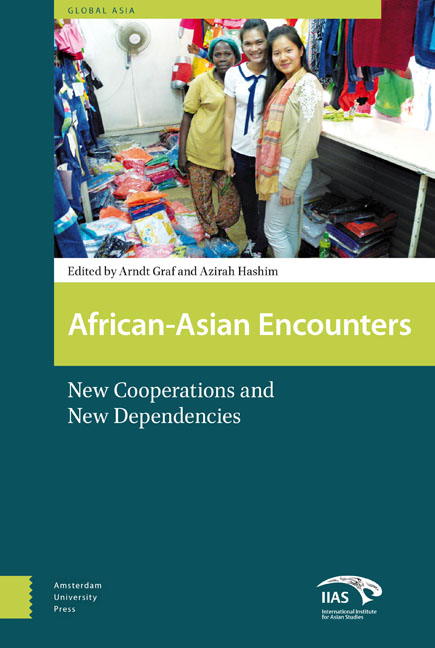8 - Enhancing Asia-Africa Relations through Further Discourse on the Mobility of Africans to Peripheral Asian Countries: The Outcome of Exploratory Studies from the Philippines
Published online by Cambridge University Press: 28 January 2021
Summary
Introduction
Since the end of bipolarity in the early 1990s, the rise of new political and economic realignment has been challenging the monopolistic nature of the control of the international political economy mostly through trade, financial movements, and technological input by Western European powers, including the United States (Lumumba-Kasongo 2013: 120). Various types of political forces within this broad movement in most parts of the world are demanding the articulation of some forms of a multipolar world in political management of the world's resources. It is the contention of Lumumba-Kasongo (2013) that this multipolar scenario opens up new options for economic development, political solidarity, and the emergence of a transnational civil society. Within this multipolar world, the transregional arena has for its part witnessed a strong growth of African-Asian interactions which may well have a decisive impact on the twenty-first century. Relations between Asia and Africa are rooted in the 1st Asian Relations Conference, an ‘unofficial’ meeting of 28 Asian states that was held in New Delhi in 1947 and had but one African delegate, Egypt (Von der Mehden 1965: 344). The meeting dealt almost entirely with Asian issues, although these had wider significance. A later conference held in 1949 in Indonesia was again dominated by representatives from Asia while Africa had only two delegations, namely from Egypt and Ethiopia. At the 1st Asian Socialist Conference held in Rangoon in 1953, Egypt was the only official delegation from Africa with observers sent from organizations in Algeria, Tunisia, Kenya and Uganda, against eight Asian delegations including three from South East Asia (Von der Mehden 1965). The most cited conference bringing representatives from Asia and Africa together was that held in Bandung, Indonesia, in 1955. Attending the conference were 29 countries of which five were from Africa, namely Ethiopia, Sudan, Egypt, Libya, and Ghana (then called the Gold Coast) (Von der Mehden 1965). Apart from Egypt's Nasser playing a role, albeit not as large as hoped, the rest of the African delegation was so ineffective that not one of its members was on the subcommittee on colonialism (Von der Mehden 1965). The final communiqué of the conference took up issues on apartheid South Africa and French North Africa, but it was largely silent on other questions relating to Africa (Von der Mehden 1965).
- Type
- Chapter
- Information
- African-Asian EncountersNew Cooperations and New Dependencies, pp. 217 - 238Publisher: Amsterdam University PressPrint publication year: 2017

